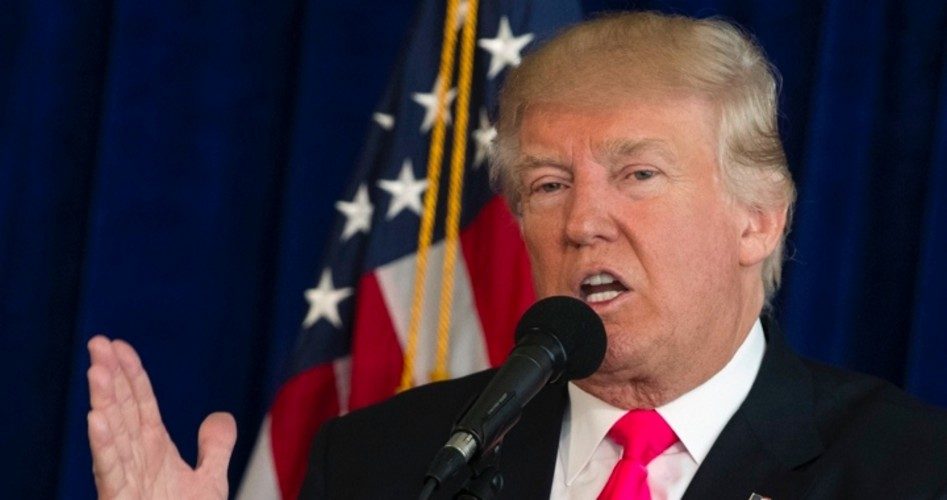
Donald Trump — never one to miss an opportunity to say something bold — called on Russia during a press conference Wednesday to “find the 30,000 emails that are missing” from Hillary Clinton’s private, unsecured e-mail server. Clinton deleted around 33,000 e-mails before turning her private server over to the Department of Justice last year. She claimed that the deleted e-mails were all private and not related in any way to her job as secretary of state.
The mainstream media quickly spun Trump’s remarks to claim that, as The Miami Herald put it, Trump was inviting “a foreign power to use its hacking abilities to get involved in the U.S. presidential election.” Coming on the heels of the DNC leaks, which the Clinton Campaign and the Democratic National Committee have both claimed were perpetrated by state-sponsored Russian hackers in an effort to manipulate the election in favor of Trump, the brash statement made by The Donald seemed to play right into the hands of the DNC.
The Miami Herald was not alone in its claim that Trump was recruiting a foreign power to hack and leak. The New York Times went so far as to say that Trump was “essentially urging a foreign adversary to conduct cyberespionage against a former secretary of state.” NBC News said “Donald Trump asked Russia to help ‘find’ the missing emails from Hillary Clinton’s private server,” implying that he had “endorse[d] foreign governments meddling in America’s election and domestic affairs.” ABC News — while mostly keeping to the middle of the road in its reporting — insinuated much the same sentiments, saying, “Many observers offered a swift rebuke, claiming that Trump had been essentially inviting a foreign country to hack the US, and intervene in our elections.”
But is this characterization accurate? Before the mainstream media gets too far ahead of itself, perhaps a couple of points should be illuminated. First, Clinton’s server — which was turned over to the Department of Justice last year — is out of operation. It essentially does not exist as a server any longer. Second, it is impossible for a foreign power — or anyone else for that matter — to hack something that does not exist. Given those two pieces of information — and the propensity of two plus two to always equal four — Trump could not have been inviting “a foreign power to use its hacking abilities to get involved in the U.S. presidential election,” or “urging a foreign adversary to conduct cyberespionage against a former secretary of state,” or endorsing “foreign governments meddling in America’s election and domestic affairs” or “inviting a foreign country to hack the US, and intervene in our elections.”
In a clear demonstration of not letting the facts get in the way of a good narrative, the mainstream media and the Clinton campaign saw this as a chance to continue beating the same tired old drum that the DNC had started playing in an attempt to draw attention away from the obvious implications of last week’s WikiLeaks disclosures.
Almost as soon as it was reported that the DNC had rigged the primary race in favor of Clinton and had offered cushy federal appointments in exchange for large donations to both the DNC and the Clinton campaign, both the DNC and the Clinton campaign accused Russia of involvement in the hack to help Trump win the White House. The implication was that Trump is Putin’s choice and the American people should reject him in favor of Clinton. In a classic example of Left-think, the very people who have actually manipulated elections and played a rousing game of quid pro quo are accusing Russia and Trump of attempting to do the same while offering exactly zero evidence either that Russia was involved or that Trump was the intended beneficiary.
The motive for the DNC and Clinton campaign to throw the attention on Trump is obvious: As long as the American people can be force-fed a diet of news articles focusing on the alleged collusion between Russia and Trump and their supposed attempt to corrupt the election process, perhaps those same American people will overlook the fact that that is exactly what the DNC and Clinton campaign were caught doing — with irrefutable evidence to prove it.
Only minutes after Trump’s remarks, his VP running mate, Indiana Governor Mike Pence, said in a statement that if it turns out that Russia is behind the DNC hack, there will be “serious consequences.” “If it is Russia and they are interfering in our elections, I can assure you, both parties and the United States government will ensure there are serious consequences,” he said.
Trump’s senior communications advisor, Jason Miller — in a series of tweets — clarified that Trump was not calling for Russia — or anyone else — to hack and leak, saying, “To be clear, Mr. Trump did not call on, or invite, Russia or anyone else to hack Hillary Clinton’s e-mails today,” and “Trump was clearly saying that if Russia or others have Clinton’s 33,000 illegally deleted emails, they should share them w/ FBI immed.”
Since those 33,000 e-mails are already deleted and the server is out of commission, Miller’s explanation makes much more sense than the accusations that Trump was asking for a foreign power to hack Clinton and leak the findings.
So, if Trump was not calling on Russia to hack and leak, what was he doing? Why would he play so close to such a hot issue when he has been accused by the DNC, the Clinton campaign, and the mainstream media of benefiting from the actions of “state-sponsored Russian hackers”?
It appears that Trump may be crazy like a fox. His statements accomplished something investigators and the media have been unable to do all along: get Clinton to admit that those 33,000 deleted e-mails contained information important to national security. Clinton has always claimed that there was nothing in the e-mails she deleted except personal communications that she described as “my yoga schedule” and “wedding plans” for Chelsea.
In a rush to attack Trump, the Clinton campaign forgot itself. Clinton’s senior policy adviser, Jake Sullivan, responded by saying, “This has to be the first time that a major presidential candidate has actively encouraged a foreign power to conduct espionage against his political opponent.” He went on to add, “That’s not hyperbole. Those are just the facts. This has gone from being a matter of curiosity and a matter of politics to being a national security issue.”
The natural question for the mainstream media to ask would be, “Are you saying that Mrs. Clinton’s exercise routine or Chelsea’s floral arrangements is a national security issue’” And a good follow-up question would be, “What was really in those 33,000 deleted e-mails?”
The Clinton campaign will undoubtedly spin this — that’s what they do when caught in the glaring light of truth.
Any way you slice it, though, Hillary just got Trumped.
Photo of Donald Trump: AP Images




